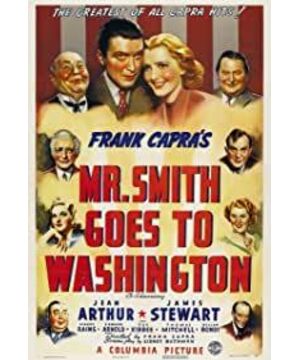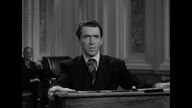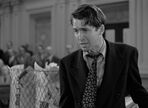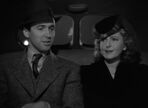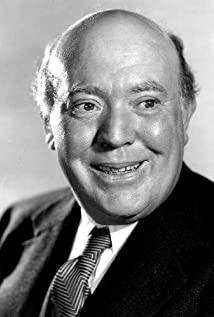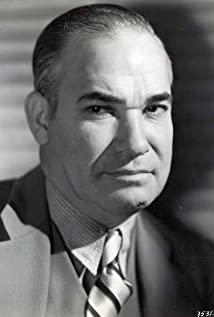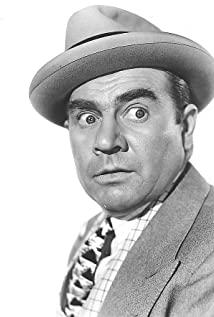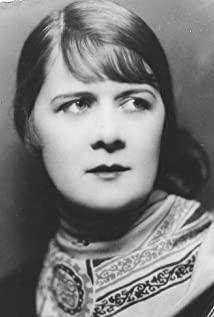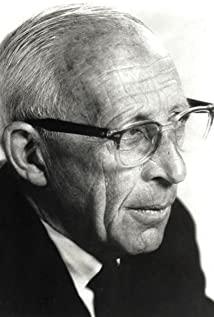The film tells the story of Mr. Smith, the leader of a rural youth scout in the United States in the 1930s, who was unexpectedly elected to Congress and entered the political arena. An idealistic young man with ideals and advocating independence and freedom, but witnessed the corruption and darkness of the political world. In the end, with the help of female assistant Sanders and others, he persevered, stuck to his inner ideal, and finally succeeded. The free and independent optimism of the protagonist is highly consistent with the American spirit, and the reflected American status quo, personal idealism and the brilliance of judicial procedures are also in line with American democratic political ideology.
In the process of expression, the film focuses on the rise and development of two pairs of contradictions in the struggle, namely the contradiction between male and female, and the contradiction between individual and mechanism. This article focuses on the analysis of the value pursuit gap caused by the difference between men and women in a specific era, as well as the interaction between personal idealism and government mechanisms. It is through the process of contradiction from opposition to unity that director Capra shows that the film is intended to make a difference to the American people. The intention of democratic political re-education is in line with the strong call of the "American Dream" at that time.
The unity of opposites between male and female
"Mr. Smith to Washington" was released in the United States in 1939. The background of the story is the United States in the 1930s. The whole world is shrouded in the shadow of the Great Depression. Especially in the United States, the shortage of capital has brought about export and domestic consumption. A sharp drop, the absence of a market led to the closure of a large number of factories, which led to mass unemployment. It was not until Roosevelt took office in 1933 to implement the New Deal that the United States got rid of the economic crisis, but the overall economy was still sluggish. The Great Depression was terrifying, and the most serious problem it brought was the problem of survival. Under the background of the times, women's lives were more difficult than men's. They were well aware of the cruelty of reality, but they had to rely on men in order to survive. Just as in this film, all the men in politics, including Smith and members of parliament, the focus of their plans is never on survival, but on the pursuit of ideals or interests, whether selfless or selfish, this value higher than survival Pursuit is the most essential gap between men and women in that era.
(1) The essential gap in the pursuit of value in the context of the times
1. Confrontation of thinking when entering the political arena
In the first half of the movie, when Smith first entered politics and met Sanders, Sanders scoffed at Smith's patriotic enthusiasm and ambition. After Smith returned from visiting the Capitol in private, Sanders' first reaction as secretary was to blame him. It was out of proportion to disappear in front of the crowd for up to five hours, which was obviously not in line with her usual rules of survival. Smith was still immersed in his dreams, and he said with joyful yearning in his eyes: "(The Capitol) is really big, shining in the sun, and I, I can only start walking towards him...I I don't think I've ever seen such a great, Lincoln monument in my life! God! Mr. Lincoln is there he's looking at you as you step up the stairs, like he's sitting there waiting for someone to come."
From the later conversation between Sanders and Diess, we can know that Sanders was moved by Smith's innocent behavior and words, but she called Smith a "child with a flag in his hand" and called him Those words were "fake patriotic words", and she was moved like a mother hearing her child's immature and immature speech. While worrying about the child's future development, she also carried contempt and contempt from the so-called adult's eyes. Disapprove.
Sanders' disdain for naive ideals is understandable. She came to work in the city at the age of sixteen. The idea of reality, and all that is really just, to survive. This is different from the simple and free Smith who grew up in the countryside, and is also different from the bourgeoisie who received aristocratic education and had their own life system. Therefore, under a specific background, there is a difference in the pursuit of values between men and women. Women pursue survival needs, while men pursue value needs.
2. Completely different nature of thinking
Also embodying the gap between women and men, Sanders is very sad after finding out that Susan and Smith have a relationship to some extent, coupled with seeing through the dark side of the political arena, he has a yearning for the ideal world of freedom that Smith describes. , so she begged Diess to take her away. She told Diess about her heart: "I feel like a mom, taking her child to school for the first time, watching him walk around in a round bag, hoping he can defend himself. ... What does it have to do with me? We put He was dropped from the hot air balloon, I just hope I don't have to be there. ... I don't have to accept it, I won't be an accomplice in the murder, I'm going to resign, I've had enough." And Sanders hugged In a half-joking, half-probing mentality, he proposed marriage to Diess, and asked Diess to take her out of here: "Like ordinary people, just like we walked out of the tunnel. You have never seen the grass on the grasslands being blown by the breeze. ...or a lively mountain stream, or a moving herd of cows in the sun, you've never seen any of these, have you?" Of course Sanders wasn't Edith, and neither was her ideal person to take her away from. He, on the contrary, maybe Dess really married Sanders, but when Sanders asked Dess to take her away, full of desire for freedom, Dess was perfunctory and disapproved. He asked her over and over again, "Is the wind tiring there?" "Have you seen it?" "Do we have to?" He only took Sanders' invitation to escape as a spur of the moment, or even a joke . Because as a man, as a man who can express his own opinions and pursue more interests in the political arena, he can get what he wants while being restrained. He can continue to lie down when he doesn't want to move, or he can Having a seat in the parliamentary auditorium, he can give less than Sanders but have a more comfortable life than Sanders, so he doesn't want to leave, and never thinks of it that way. This is the difference in pursuit between men and women in the context of the times. 2. Completely different nature of thinking Also embodying the gap between women and men, Sanders is very sad after finding out that Susan and Smith have a relationship to some extent, and seeing through the dark side of politics, he has a yearning for the ideal world of freedom described by Smith. , so she begged Diess to take her away. She told Diess about her heart: "I feel like a mom, taking her child to school for the first time, watching him walk around in a round bag, hoping he can defend himself. ... What does it have to do with me? We put He was dropped from the hot air balloon, I just hope I don't have to be there. ... I don't have to accept it, I won't be an accomplice in the murder, I'm going to resign, I've had enough." And Sanders hugged Half-jokingly, half-probingly, he proposed to Diess to get married, and asked Diess to take her out of here: "Like ordinary people, just like we walked out of the tunnel. You have never seen the grass on the grasslands being blown by the breeze. ...or a lively mountain stream, or a moving herd of cows in the sun, you've never seen any of these, have you?" Of course Sanders wasn't Edith, and neither was her ideal person to take her away from. He, on the contrary, maybe Dess really married Sanders, but when Sanders asked Dess to take her away, full of desire for freedom, Dess was perfunctory and disapproved. He asked her over and over again, "Is the wind tiring there?" "Have you seen it?" "Do we have to?" He only took Sanders' invitation to escape as a spur of the moment, or even a joke . Because as a man, as a man who can express his own opinions and pursue more interests in the political arena, he can get what he wants while being restrained. He can continue to lie down when he doesn't want to move, or he can Having a seat in the parliamentary auditorium, he can give less than Sanders but have a more comfortable life than Sanders, so he doesn't want to leave, and never thinks of it that way. This is the difference in pursuit between men and women in the context of the times. The invitation was taken as a whim, or even a joke. Because as a man, as a man who can express his own opinions and pursue more interests in the political arena, he can get what he wants while being restrained. He can continue to lie down when he doesn't want to move, or he can Having a seat in the parliamentary auditorium, he can give less than Sanders but have a more comfortable life than Sanders, so he doesn't want to leave, and never thinks of it that way. This is the difference in pursuit between men and women in the context of the times. The invitation was taken as a whim, or even a joke. Because as a man, as a man who can express his own opinions and pursue more interests in the political arena, he can get what he wants while being restrained. He can continue to lie down when he doesn't want to move, or he can Having a seat in the parliamentary auditorium, he can give less than Sanders but have a more comfortable life than Sanders, so he doesn't want to leave, and never thinks of it that way. This is the difference in pursuit between men and women in the context of the times.
3. Susan - social value comes from not her own value. There is also a female character in this film, Susan, the daughter of Senator Paine. Even a girl who has lived in lights and flowers since childhood, her value is also Born from being attached to men, the superiority of her existence comes from her father, and she will be used by her father to hold Smith, and people see her value only in her "first lady" value, not herself. the value of. (2) Self-correction and integration of value pursuits The essential differences in the value pursuits of men and women in a specific era have led to the constant collision of thoughts on both sides, and contributed to the possibility of mutual guidance of value thinking. However, due to the unifying effect of opposites, the two sides can learn from each other and make use of the factors that are beneficial to them to develop, which leads to the transformation and fusion of ideas. It was the ideological collision and struggle between the two in the early stage that determined the inevitable situation of one party infecting the other. Sanders, the representative woman in the film, was touched by the ideal of the male protagonist and changed his mind, which is the pursuit of men and women from The turning point of opposition to unity is also the key to the beginning of things moving forward. Smith told Sanders about his spirit and ideas. He believed that freedom could not only be mentioned in books. He wanted children to grow up with the pursuit of freedom. He also referred to what his father said to him "remember to look at the life around you as if you just came out of a tunnel". The film reminds me of the touching and tender soundtrack at the right time. The camera gives Sanders a beautiful close-up. Her eyes are moist, and her expression is gentle and yearning, like a goddess in mythology. Obviously, she was moved by Smith's ideals. The always intellectual and mature female assistant was touched to the softest part in her heart, and she even revealed to Smith her experience when she was young. Since then, women's emotions have gradually exploded, and they have also begun to integrate with the ideals that Smith pursues. Gradually, from being unworldly and troubled to seeing hope, she began to be willing to walk side by side with Smith to realize his ideals and ambitions. The resourceful female assistant leads Smith through the low tide, using her wits to help him stand in the chamber again. When she's running around for Smith's innocence, when she's gesturing at Smith in the audience, when she's getting the reincarnated boy to deliver the letter of confession to Smith, I think it's every man's dream woman. Since then, the value pursuit of men and women has changed from confrontation to acceptance, and finally ushered in a social combination, which is in line with the psychological expectations of the American people at that time.
2. The unity of opposition between individuals and mechanisms An idealist with aspirations and advocating freedom, after entering the political arena, witnessed the corruption of high-ranking political officials in the United States, so he put forward a proposal opposite to that of the House of Representatives, trying to change the status quo of corruption and lawlessness in the US Senate, and finally was successful. Undoubtedly, this is an idealistic hymn, an almost impossible miracle in reality. But "miracle" has always been the theme of Frank Capra's films. Almost all of his films tell the audience about various miracles: Shangri-La in war, the rich falling in love with the poor, and the unlucky one's dream come true overnight. ...including the humble village youth in this film who became members of Congress. The essence of this motif is the "American Dream". Director Capra has always maintained a eulogy to the traditional American character. This film is expressed through the sense of social responsibility and idealism of young people who have stepped into the American political world. In this way we find the contradiction between personal ideals and the entire political world. (1) Breaking the personal idealism of monopoly politics 1. Reshaping the American political myth through personal ideals Throughout the film, there are repeated scenes of the magnificent Capitol Building and the solemn statue of the father of the country, and they tell us about Congress through Smith’s perspective And the authority of the statue of the founding father, and the "Declaration of Independence" repeated by Smith to emphasize the ideological inheritance of democracy and freedom. When Smith first entered the political arena, he was attracted by the Capitol Building and the statue of the founding father, so he couldn't help walking away from the crowd, walking step by step to the statue of Lincoln. The bright rays of the sun are projected one by one, and "life, freedom, and the pursuit of happiness" will always be remembered in my heart. At this time, with the transition scene that fades in and out, and the lyrical and moving soundtrack, Smith's eyes are full of yearning for ideals and beautiful fantasies about the future of America. A knight who single-handedly wants to defend democracy and freedom. When Smith and his secretary were drafting the bill late at night, he pointed to the brightly lit Capitol building outside the window and expressed his sincere ideals of freedom to the secretary, saying: "I want to realize the dream for every child in this land, right. , also lit like it (Congress). You see, children forget what the country means, and if they only see 'the land of freedom' from history textbooks, they will forget more as adults. Freedom is very precious Things can't just be seen in books. People should keep in mind, and say every day, that I can think freely, speak freely. My ancestors couldn't, but I could, and so could my kids. When kids grow up Such a memory should be carried." Smith's words are simple and simple, but they are full of optimistic liberal spirit, and they are also highly consistent with the national soul of the United States. These starkly liberal, idealistic segments have made the director's intentions clearer than ever, re-establishing the political myth of America through the realization of personal ideals, and re-educates the audience about democratic politics. These idealistic fragments of optimism stand in stark contrast to the power struggle and smog of the U.S. Congress next door. However, even with the status quo of the big capitalists covering the sky and the senators compromising and making concessions in order to live in peace, American politics still has a breath, and democratic politics has not fallen. There are still some democratic ideas of independence and freedom that are the foundation of the country. in perpetuity. These precious ideas have been preserved from the great founding fathers and those early legislators, and they have been deeply instilled in the Declaration of Independence and those ideas of liberty that have been forgotten by some, and then waited for a heart like Smith. The idealistic young people will carry them forward again and pass on the fire from generation to generation. These starkly liberal, idealistic segments have made the director's intentions clearer than ever, re-establishing the political myth of America through the realization of personal ideals, and re-educates the audience about democratic politics. These idealistic fragments of optimism stand in stark contrast to the power struggle and smog of the U.S. Congress next door. However, even with the status quo of the big capitalists covering the sky and the senators compromising and making concessions in order to live in peace, American politics still has a breath, and democratic politics has not fallen. There are still some democratic ideas of independence and freedom that are the foundation of the country. in perpetuity. These precious ideas have been preserved from the great founding fathers and those early legislators, and they have been deeply instilled in the Declaration of Independence and those ideas of liberty that have been forgotten by some, and then waited for a heart like Smith. The idealistic young people will carry them forward again and pass on the fire from generation to generation. These starkly liberal, idealistic segments have made the director's intentions clearer than ever, re-establishing the political myth of America through the realization of personal ideals, and re-educates the audience about democratic politics. These idealistic fragments of optimism stand in stark contrast to the power struggle and smog of the U.S. Congress next door. However, even with the status quo of the big capitalists covering the sky and the senators compromising and making concessions in order to live in peace, American politics still has a breath, and democratic politics has not fallen. There are still some democratic ideas of independence and freedom that are the foundation of the country. in perpetuity. These precious ideas have been preserved from the great founding fathers and those early legislators, and they have been deeply instilled in the Declaration of Independence and those ideas of liberty that have been forgotten by some, and then waited for a heart like Smith. The idealistic young people will carry them forward again and pass on the fire from generation to generation.
2. The idealist Paine who adhered to his beliefs listened to Taylor's words and framed Smith for the first time. After he framed Smith for the first time, he pulled Smith into the office to try to persuade him to compromise. He said that thirty years ago, I held the same ideals as you are now. face the same choice. And he chose to compromise and bow to power and capital, because if he can't stay in the Senate, all his ideals and aspirations are just empty talk. This is the paradox of reality — ideals require you to be individualistic, but achieving them requires you to compromise with collective mechanisms. In corrupt political rules, compromise is even a virtue, and it is a common bribe method used by the capitalists at the top of the food chain. Because of this, too many once idealistic young people like Paine have chosen to compromise and make concessions, and after retreating again and again , the beliefs and principles in their hearts are long gone. Faced with Paine's true face, Smith made the opposite choice - stick to it. Even if he had decided to leave at that time, even if he left, he would not give up his ideals and beliefs, and even if he left, he would fulfill his pursuit and yearning for independence and freedom. This is a pure land reserved for his heart by an idealist. When Smith refused to compromise, it was a victory in itself. 3. The unrepentant idealist, who refused to compromise, walked out of the Senate with his luggage and sat down at the corner of the Capitol in dejection. He even covered his face with his hands and wept, and took off his hat representing urban civilization. For the first time, he felt hopeless and intend to leave. Sanders stopped him, saying, "You can't resign now! You can't! Not everyone in Washington is Tyler and Paine, that's just paper tigers. You can't just trust Paine or anyone else alive, you have to trust more Big stuff - decent, ordinary justice. Remember the first day you came here, you said about Lincoln, he was waiting for someone to come? You're right, he was waiting for someone who could see him Whoever does the job, who does his mission, who can tear Tyler apart and uproot them, I think he's waiting for you. He knows you can do it, and so do I." Perhaps it will not be touched for ordinary people to hear this sentence, because very few people are really willing to be a knight who only has a solitary voice but no sword and shield. Before seeing the results, most people just think that people who are single-handedly are fools. But idealists don't think so, they believe, really believe, and feel guilty for their escape. They have no resistance to the words "justice", "duty" and "loyalty", and only they can have the courage to use their personal ideals to overcome monopoly politics. In the face of no turning back, every idealist is a fragile item. They use their pure self to fight against the entire corrupt world. They are idealistic redemption, and they are "miracles" that exist in movies but cannot exist in reality, but Undoubtedly worthy of praise.
(2) The premise of realizing personal ideals is procedural justice. Although the film uses personal idealism to break the corrupt political mechanism, the director also deliberately expresses the "procedural justice" in the process of American politics and judicial enforcement. What is special and interesting about genre films. When Smith returned to parliament to defend himself, it was the chairman of the conference who finally allowed Smith to speak; when Paine retorted angrily that "no one cares what a person condemned to say", he was also rebutted, even if It was the guilty who also had a say, and Smith was allowed to continue to defend himself. Because free speech in America is: You persuade until you die. The "procedural justice" of American politics and justice means that as long as a senator has the freedom to speak, defend and appeal in accordance with legal procedures, he can continue to speak in Congress. So in order to gain time to gain support from the people in his hometown, Smith could speak in Congress for 20 hours until he finally passed out. It is because of the support of procedural justice that there is that dramatic reversal at the end of the film. Embodying the spirit of politics and law and fairness and justice by capturing the brilliance of American politics and justice is what sets this film apart. (3) Ending – the joint action of individual and mechanism At the end of the film, Smith realized the truth that “only a cause destined to fail is a cause worth fighting for” in the desperate situation where all the media and public opinion were against him. Paine came to his senses and pleaded guilty, and Smith won the battle. ——“Only a cause destined to fail is a cause worth fighting for.”
This brings me to another story with the same effect: out of disgust for radical nationalists, the famous Argentine writer Borges joined the Conservative Party around 1960 because he said that the Conservative Party was undoubtedly the only No fanatical parties. But under the national conditions at the time, the Conservatives had no chance of winning. Everyone was surprised. Borges replied: "A gentleman is only interested in a cause that has been defeated." Some people are happy with this Capra style. The ending scoffed, maybe it's really hard to exist such a successful idealist in real life, but we know that Smith did win, not because he moved Paine, not because the ending was written that way. He won because his ideals were heard. The children heard it, and the Boy Scouts printed newspapers for him all night; the people in his hometown heard it, and the people spontaneously marched for him; the legislators heard it, and they finally put down the newspaper and began to listen to his speech. He won because he wasn't fighting alone, and the battle that was doomed reverberated.
3. Conclusion
If Smith's adherence to ideals reflects the compromise of government mechanisms to individuals, then "procedural justice" is the premise for Smith to adhere to his ideals in the end. This kind of mutual causation and integration of the two sides just reflects the unity of opposites between the contradictory parties. . It can be said that Smith's final success is the joint result of the unrepentant adherence to personal ideals and the inviolable part of the fair and just role of the government mechanism itself. It is a delicate balance between personal ideals and beliefs and the protection of government mechanisms in Smith's adherence. The film reflects director Capra's confidence and pride in American-style democracy, but at the same time he focuses on the emotions and pursuits shared by all human beings - true freedom, equality and democracy are higher than government mechanisms. and personal emotional, true American-spiritual liberalism.
View more about Mr. Smith Goes to Washington reviews


